
The large outdoor amphitheater.
From the Shrine website:
Christ the King Chapel, the Mary Chapel and the Rosary Courts are integrated into the Main Shrine area. A massive steel framework was built. Wet cement was sprayed over the entire structure to form a shell. Rising gracefully from the concrete shell is a 50' concrete "M" which stands for Mary, the Mother of Jesus. A 70' spire rises from the apex of the symbolic "M" serving as a beacon guiding visitors to the magnificent setting. Three circles, representing the Holy Trinity, surmount a bronze cross. A bronze dove in downward flight is at the base of the spire, symbolizing the Holy Spirit.
Our Lady of the Snows
The 16' fiberglass statue of Our Lady of the Snows stands beneath the symbolic dove and before a tongue of fire. She is surrounded by a chalice symbolizing her role as Christ's Mother. Her gown is designed in the form of a Calla Lily, a symbol of purity. She holds the Christ Child up and forward, presenting her Son to the world.
The Altar
The black marble altar in front of Our Lady of the Snows is the Main Altar for outdoor liturgies at the Shrine. Artist Rodney Winfield designed the large bronze crucifix, the tabernacle, and the pair of three branched candelabras. The latticework of metal rings beside the chalice represents graces flowing to us from God. Additional rings and circles are reflected in stonework on the first and second levels of the sanctuary, emphasizing Christs blessings to all who receive Him.
The above photo was taken in October, 2005. The following photos were taken in June, 2008.
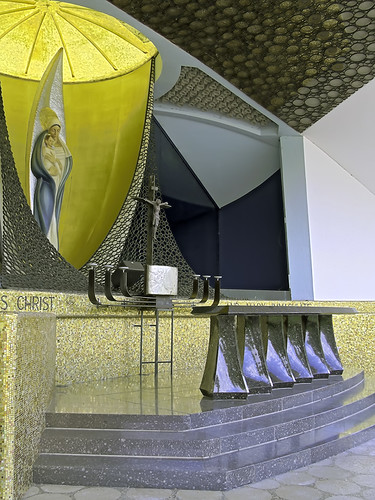
Here is a close up of the outdoor altar. The chapel dates from 1960, and is one of the best examples of modernism applied to Catholic architecture that I've seen. Whether or not you like this style, clearly this shrine was constructed with a lofty and cohesive plan, attention to detail, and quality materials and workmanship, and has extensive iconography. These are lacking in the vast majority of Catholic churches built in the last forty years.
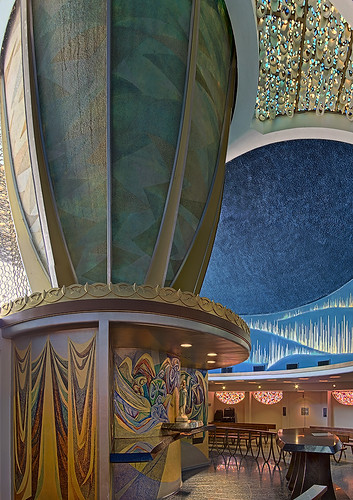
This is Mary's Chapel, which is located behind the altar shown in the previous photo. The statue of Mary seen in the previous photo is inside of the tall green structure seen here.

Here is a close up of the outdoor altar. The chapel dates from 1960, and is one of the best examples of modernism applied to Catholic architecture that I've seen. Whether or not you like this style, clearly this shrine was constructed with a lofty and cohesive plan, attention to detail, and quality materials and workmanship, and has extensive iconography. These are lacking in the vast majority of Catholic churches built in the last forty years.

This is Mary's Chapel, which is located behind the altar shown in the previous photo. The statue of Mary seen in the previous photo is inside of the tall green structure seen here.
From the Shrine's website:
...Celestial scenes of adoring angels are depicted on a circular center wall, created by artist Karl Peterson. A gold and platinum wax base was applied by hand to achieve the breathtaking, three-dimensional effect.
The Aurora Borealis, or Northern Lights, form the panoramic backdrop that shines through the plate glass behind the Outdoor Altar. When lit at night, it envelops the statue of Our Lady with a soft, colorful aura of light. The Aurora Borealis recalls the work of Fr. Paul Schulte, O.M.I., the famous "flying priest of the Arctic," who was known for his work among the Inuit (Eskimo) people. In the Arctic, the Aurora Borealis appears over the frozen horizon as a fiery, vertical rainbow.
The Blessed Virgin Mary and Christ Child, surrounded by adoring angels, is the backdrop to the black, polished granite altar.
The Church tends to have an inherently cautious approach to liturgical art, as it ought. This chapel dates from 1960, but some elements of its style appear twenty or so years older, and so these chapels have a certain comfort to them, which otherwise was missing in much of the secular architecture of its day. However, that same tendency means that there are, unfortunately, still Catholic churches being built today in the hard style of iconoclastic Modernism, even though the secular world abandoned that style in the early 1970s.
The stained glass windows are non-representational.
Holy water font.
Detail on the doors of the confessional. The figure to the left is Saint James the Greater; and to the right is... Saint Thomas? I can't tell.
Old Testament doors to Mary's Chapel. According to the Shrine website:
The two sets of bronze doors at the entrance of the Mary Chapel represent a significant artistic achievement. Designed by artist Rodney Winfield and cast by an eleven-man crew, the four panels weigh over a half-ton. Fred Lutz of Century Brass remembers the many days of trial and error and an endless stream of calculations. Finally, molten bronze was poured into the huge molds and the doors were cast. After eight months of grinding, finishing, and silvering, the artist burnished the doors and coated them with epoxy to protect them from the elements.The Winfield Gallery website shows some works by Rodney Winfield on classical themes; he also worked for the famed Emil Frei Stained Glass company.
The doors at the right side of the chapel depict the major Old Testament prophets-Moses, Isaiah Jeremiah, and Ezekiel surrounding the tree of Jesse. The New Testament doors, found on the left side of the chapel, depict the Nativity of the Child Jesus. The four Evangelists surround a palm tree that represents Christ's martyrdom. The center section of the doors illustrates the two great Sacraments of the Church (Baptism and the Eucharist).
The New Testament doors. Even though the shrine is nearing 50 years old, it still is in good condition.
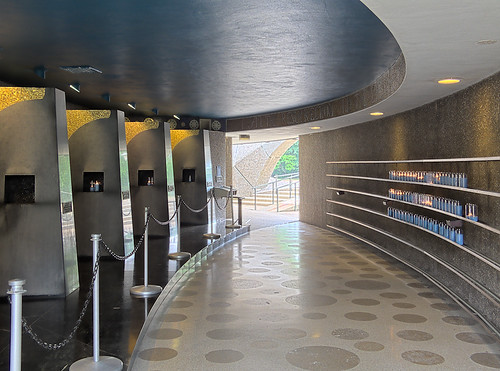
Underneath Mary's Chapel is the Rosary Court, which depicts the traditional 15 Mysteries of the Most Holy Rosary of the Blessed Virgin Mary. To the left are the Joyful Mysteries, and to the right, in this corridor, are the Glorious Mysteries; in the Chapel of of Christ the King, between the two, are the Sorrowful Mysteries.
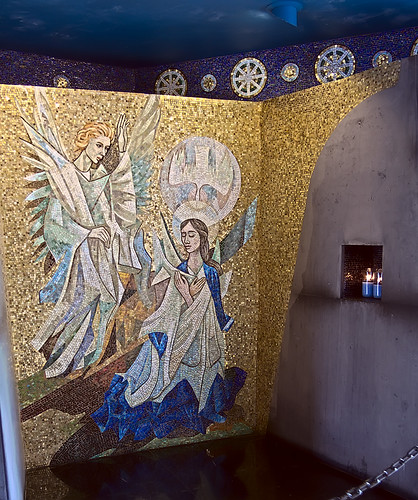
First Joyful Mystery, The Annunciation. The mosaics here were designed by Winfield and executed by the Ravenna Mosaic Company, which also did the artwork at the Cathedral Basilica of Saint Louis and Saint Cecilia's Church, among others.
August Queen of Heaven!
Sovereign Mistress of the angels!
Thou who from the beginning
hast received from God
the power and mission to crush the head of Satan,
we humbly beseech thee
to send thy holy Legions,
that, under thy command
and by thy power,
they may pursue the evil spirits,
encounter them on every side,
resist their bold attacks
and drive them hence into the abyss of eternal woe.
Amen
Doors into Christ the King Chapel. These are probably the most purely Modernistic design elements in the shrine: plain, white, functional, and without hierarchy. The door to the left leads to the narthex area, which has the confessionals, while the right door leads behind the chapel's altar to the mosaics of the Sorrowful Mysteries of the Rosary.
Interior view of Christ the King Chapel.
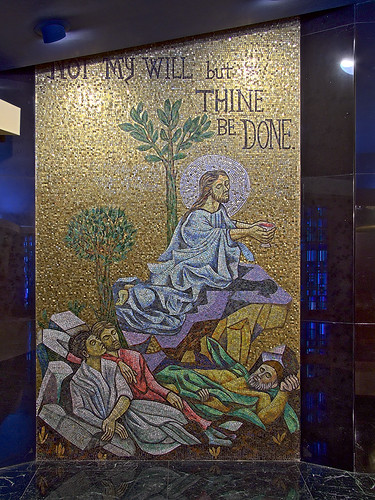
The Rosary mosaics continue inside of the chapel. First Sorrowful Mystery, The Agony in the Garden. "My soul is sorrowful even unto death: stay you here, and watch with me."

The tabernacle and Third Sorrowful Mystery, the Crowning with Thorns.
Above the altar is a canopy with a mosaic of the Dove of the Holy Ghost.
At the back of the chapel are several statues of Mary. Our Lady of Hope.
Our Lady of Knock.

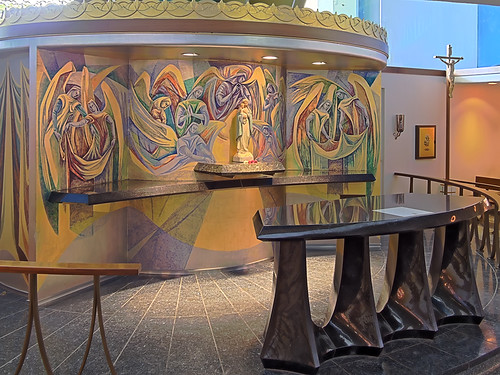
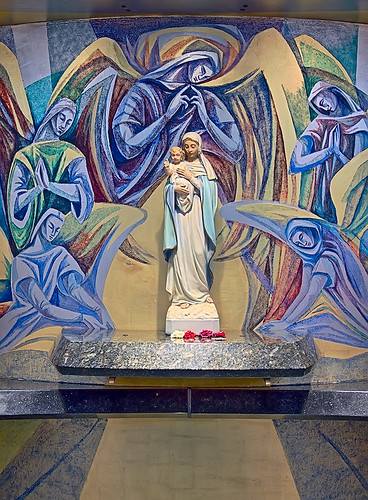
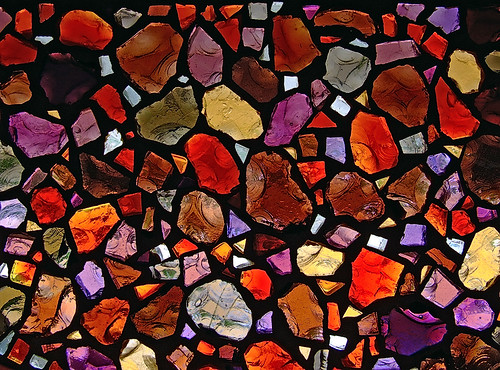
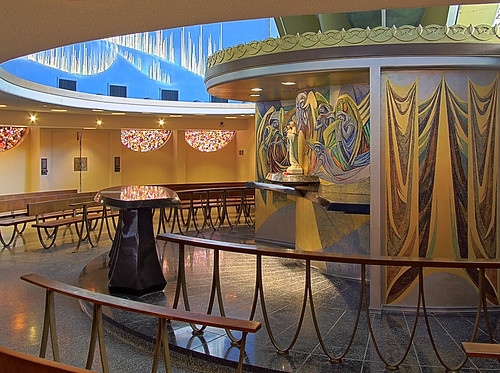
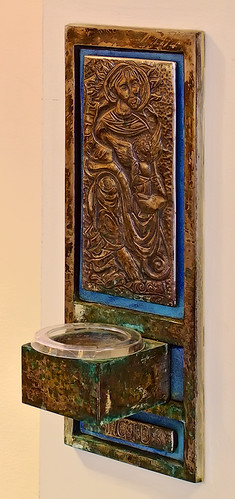
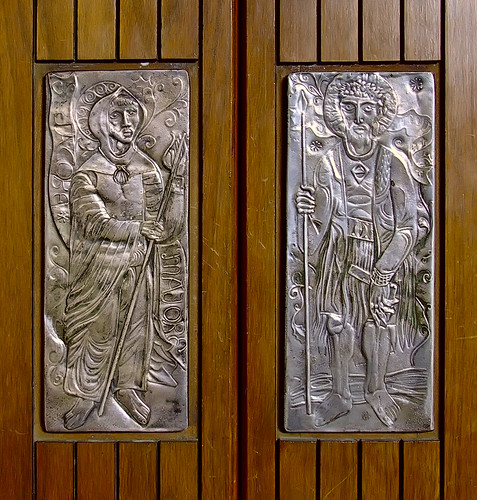
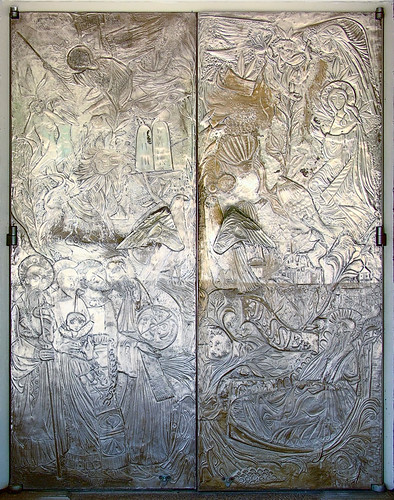
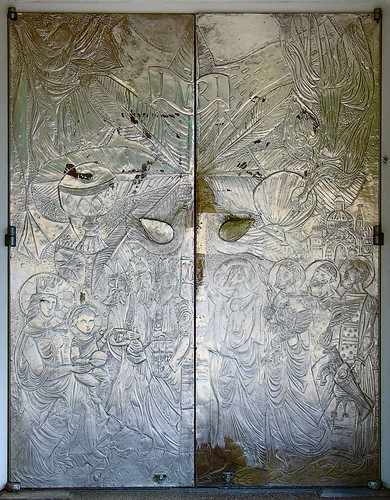
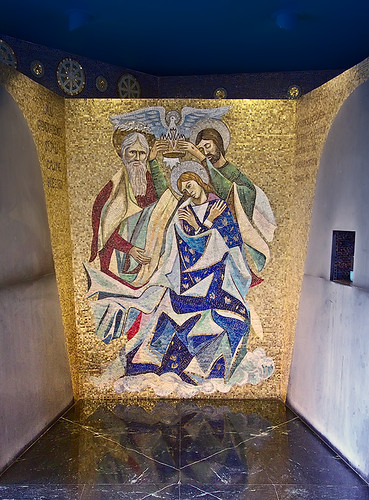

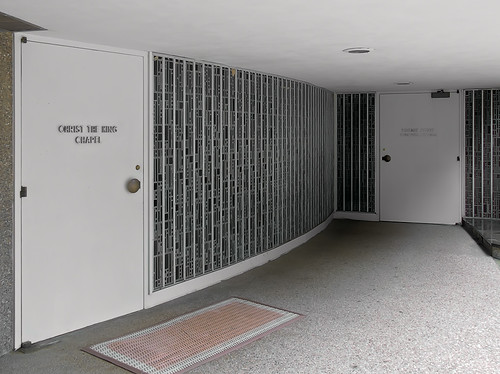
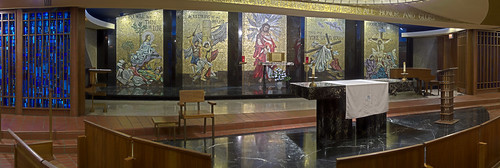
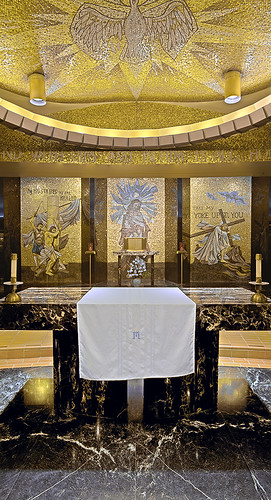
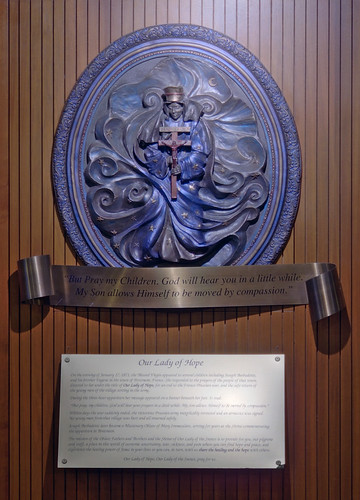

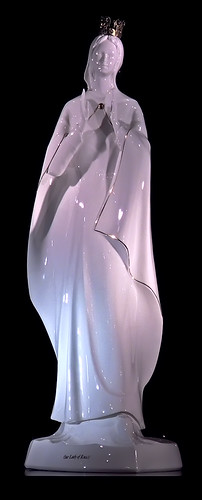
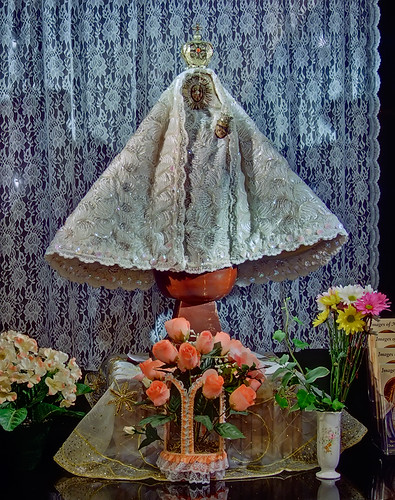

Very interesting:
ReplyDeletehttp://www.nytimes.com/2008/07/20/technology/20novel.html?ex=1374206400&en=ddc714c55008abd7&ei=5124&partner=permalink&exprod=permalink
door to the right is probably St. Longinus, considering the lance he carries. Just a guess.
ReplyDeleteThank you for such great pictures. I've not visited there in person so now I can visualize it.
ReplyDeleteI think it is spectacular, and the mosaics in particular are reverential and inspiring.
However. Here is my overall problem with modernism. Modernism by definition is an attempt to make a statement through a style. The tradition of the Catholic Church, however, is that the Church, during the sacrifice of the Mass, "opens up" as a gateway to gaze into the tabernacle and into heaven. Traditionally, large and wealthy or poor and small, Catholic churches were built with this sense of sacred space to gateway in mind. (And the Orthodox churches are even more splendidly true to that vision). Modernism competes with that experience. Modernism attempts to depict an architecture style that is reverential, rather than trying to create a space that feels on the threshold of the tabernacle and heaven itself. Modernism presents a barrier for the congregation to overcome, no matter how tasteful and beautiful. Traditional style and furnishings facilitate the fullness of the congregation's sense of standing on the threshold of the tabernacle. Modernism is that lost opportunity with, depending on its implementation, the risk of being an actual barrier to one of the aesthetics of one's "heavenly placement" in worship.
I too am grateful for the photos.
ReplyDeleteHowever, mmajorfan, I find your argument very difficult to follow. You start from assertions that are foreign to me, and from them proceed by reasonings that seem to me to be non-sequiters.
Technically, Jugenstil is not usually included under the term "modernism" -- but Google "Am Steinhof" for a modernistic space without the sort of barrier you seem to describe.
The Shrine is a magnificent work in its own way. Your photos are very generous to it. It is one of the ugliest and most grotesque places I've been to for Mass. [We went often on Sundays when I was a kid. It was 1 mile from our home. Closer than our parish, I think.] The new indoor church is also modern and is rather boxy and plain, but much more tolerable.
ReplyDeleteSorry, but I really think the old Shrine complex is ugly. The playground for my kiddies is great, however. And I also appreciate the outdoor Stations. I can't get my boys to sit through a stations inside a church, but we can walk or drive (depending on weather) that together during Lent.
Agree. Looks impressive but ugly. I'll take St. Peter's any day.
ReplyDeleteUgly. Does not feel sacred, but feels like an Alien UFO spaceship.
ReplyDeleteOur statues in Spain and the Philippines are better. Sacred, Royal, filled with gold, gemstones and elaborate fabrics. Truly deserving of heaven, and makes a devotee want to KNEEL... not abandon their rich Catholic heritage.